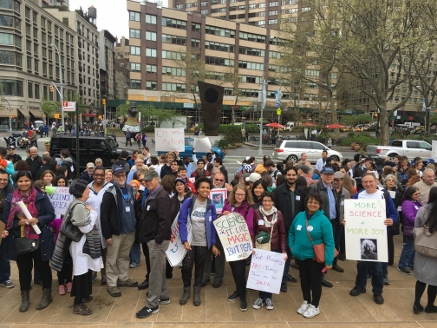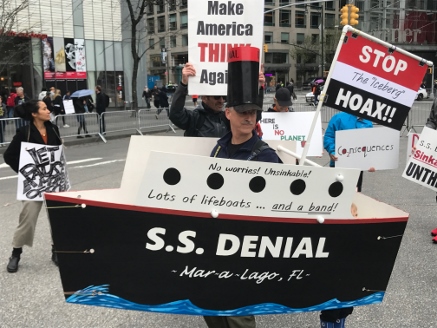Editors’ Note: This past Saturday, more than 300 members of the Albert Einstein College of Medicine community joined tens of thousands of people at worldwide demonstrations advocating for the future of scientific and medical research. Einstein students, staff and senior administration members who make up the Einstein-Montefiore Action Group took part in March for Science rallies in Washington, DC, and New York City. In this post, Einstein participants provide their impressions of the event and share their reflections on the historic show of support for science and science literacy.

***
The march was a special day for me. It was very moving to see so many known―and unknown―colleagues, trainees and coworkers with their families, responding to the call of marching together under the Einstein banner. It was particularly reassuring to feel that the strong culture of social responsibility and solidarity that has characterized the institution since its inception is still alive and vibrant. It is our responsibility to pass it on to new generations. The formation of the Einstein-Montefiore Action Group is a step in that direction.
Alberto Pereda, M.D., Ph.D.—professor in the Dominick P. Purpura Department of Neuroscience and faculty member of the Einstein-Montefiore Action Group
***
![March for Science - Sign reading "Stay Woke" [C8H10N4O2]](https://blogs.einsteinmed.edu/wp-content/uploads/sites/5/2017/04/March-for-Science-Stay-Woke.jpg) Given the growing anxiety due to political uncertainty, I was pleasantly surprised that the march in Washington, DC, felt like a celebratory occasion. Attending the march with my mom, Susan Hackett, who is, among many other things, a former biology teacher, was one of my proudest moments. I was elated to call myself a member of this community. The signs were witty and on point. They were also upbeat and optimistic. The day started with a cool, light rain, which progressed to a steady shower by the time the march was under way. Despite dripping limbs and soggy signs (one of which read, appropriately, “We knew it would rain! Thanks, science!”), the mood remained cheerful. What is now clear is that we must work harder to bring the best evidence to policy makers to ensure that our work benefits our nation and the world. The march recharged my batteries for the days to come. We will need to, as one sign put it, “Stay Woke [C8H10N4O2].”
Given the growing anxiety due to political uncertainty, I was pleasantly surprised that the march in Washington, DC, felt like a celebratory occasion. Attending the march with my mom, Susan Hackett, who is, among many other things, a former biology teacher, was one of my proudest moments. I was elated to call myself a member of this community. The signs were witty and on point. They were also upbeat and optimistic. The day started with a cool, light rain, which progressed to a steady shower by the time the march was under way. Despite dripping limbs and soggy signs (one of which read, appropriately, “We knew it would rain! Thanks, science!”), the mood remained cheerful. What is now clear is that we must work harder to bring the best evidence to policy makers to ensure that our work benefits our nation and the world. The march recharged my batteries for the days to come. We will need to, as one sign put it, “Stay Woke [C8H10N4O2].”
Liz Chuang, M.D., M.P.H.—assistant professor of family and social medicine
***
It was nearly impossible to get out of bed on a misty Saturday morning. I knew in my heart that if I didn’t move and join the Einstein crowd in front of Lincoln Center, I wouldn’t forgive myself. One of the first comments that I heard there was, “I haven’t marched like this since the ’60s,” which made me realize what a special experience it was. I met other members of the Einstein community that I would never have had a chance to get to know otherwise. We marched behind a man who was dressed as an electrical resistor, carrying a sign that read “Trump Resistor,” clearly marching for political reasons. I marched on my own terms, and for my own reasons. I marched for the field of study that provides human health, happiness and a brighter future for generations to come, which depends on both awareness and funding. I was able to do it with individuals who make up the community that contributes to this effort on a daily basis.
Margaux Sica—lab technician
***
 Our group, representing all facets of Einstein—from medical and grad students to postdocs, faculty and members of the dean’s office—headed over to the Central Park West starting point. Many had their children along, so there was a wonderful family vibe. As we stood along Central Park West during the rally, it was inspiring to see the creativity of the marchers and their support for science. From the guy dressed as a resistor to the Columbia students wielding origami dolphins and penguins to the “captain” commandeering the S.S. Denial, New York marchers promoted their love of and our need for science. Though rain did eventually fall, it didn’t dampen our enthusiasm in the least. We kept moving until we reached Times Square, where a group of colorful drummers reflected the energy that carried the day.
Our group, representing all facets of Einstein—from medical and grad students to postdocs, faculty and members of the dean’s office—headed over to the Central Park West starting point. Many had their children along, so there was a wonderful family vibe. As we stood along Central Park West during the rally, it was inspiring to see the creativity of the marchers and their support for science. From the guy dressed as a resistor to the Columbia students wielding origami dolphins and penguins to the “captain” commandeering the S.S. Denial, New York marchers promoted their love of and our need for science. Though rain did eventually fall, it didn’t dampen our enthusiasm in the least. We kept moving until we reached Times Square, where a group of colorful drummers reflected the energy that carried the day.
Karen Gardner—director, internal and web communications
***
We stayed at an Airbnb the night before the march. After returning to our rental following an evening out, we discovered that a door we had left open was now locked shut. Thinking better to be safe than sorry, we called the DC police. After checking every closet and under the beds, they noticed our signs. One of the officers was really interested, as he had never heard of the threats to science. I explained, “It’s like this. You’re a young guy. Whether you have children now or in the future, you probably would not want them drinking water with lead like the water in Flint, MI.” I also explained about the 32 percent cuts proposed for the EPA budget and how that money helps monitor the water. I added that the Department of Justice had announced cuts in funding for crime-solving science. This definitely caught his attention. The officer was really shocked and said he was going to try to learn more about what’s going on.
Karen Bonuck—professor of family and social medicine and of obstetrics & gynecology and women’s health
***
 One thing that struck me about the march was the wide range in ages of those who participated—a toddler holding up a sign that read “Fund Brains Not Bombs”; a kid, who looked about five, proudly brandishing a sign over his head, quoting Edward Teller: “The Science of Today is the Technology of Tomorrow”; another kid, slightly older, dressed up as Einstein; young adults and ancients like me, who along with my wife carried signs that read “Who Ever Knew Climate Change Was Real?” and “Science Is Essential.” EVERYONE—young and old—showed a deep concern for science and its many contributions to humankind, as it represents the last, best hope to protect our fast-deteriorating planet from threats that, if ignored, might mean we will all have to climb aboard an Elon Musk spaceship one day and transport ourselves to Mars.
One thing that struck me about the march was the wide range in ages of those who participated—a toddler holding up a sign that read “Fund Brains Not Bombs”; a kid, who looked about five, proudly brandishing a sign over his head, quoting Edward Teller: “The Science of Today is the Technology of Tomorrow”; another kid, slightly older, dressed up as Einstein; young adults and ancients like me, who along with my wife carried signs that read “Who Ever Knew Climate Change Was Real?” and “Science Is Essential.” EVERYONE—young and old—showed a deep concern for science and its many contributions to humankind, as it represents the last, best hope to protect our fast-deteriorating planet from threats that, if ignored, might mean we will all have to climb aboard an Elon Musk spaceship one day and transport ourselves to Mars.
There was a wry and deep sense of humor in many of the signs, such as “Things are getting so bad even the introverts are here,” “Make America Smart Again” and its companion, “Make America Think Again.” That humor was invaluable because we find ourselves in a situation so crazy, so absolutely nuts—defending the value of science!—that the laughter produced at the event, through signage and conversation, helped restore our souls.
But whether lighthearted or serious, the essential message was the same: “Science, Not Silence.” There was a shared sentiment that we must support and forcefully advocate for scientific research designed to address society’s many ills. With strength, determination and a firm resolve, I believe those supporting science will prevail. There is really no other choice, because science represents our best way to protect ourselves, our children and all future generations.
Gordon Earle—associate dean, department of communications and public affairs
See more Einstein pictures from the March for Science at https://www.einstein.yu.edu/special-events/march-for-science/

